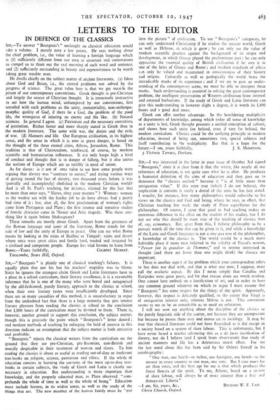Sta,—" Bourgeois" is plainly one of classical teaching's failures. It
is equally plain that not his but his teachers' stupidity was to blame. Since he ignores the strongest claim Greek and Latin literatures have to a place in a school curriculum, their literary excellence, it is a reasonable inference that he is one of the many who were bored and antagonised by the old-fashioned, purely literary, approach to the classics at school, when their own literary tastes were insufficiently developed. Since there are so many casualties of this method, it is unsatisfactory to argue from the undoubted fact that there is a large minority that gets intense literary pleasure from reading the classics at school to the conclusion that 1,800 hours of the curriculum must be devoted to them. There is, however, another ground to support this conclusion, the subject matter, though this is precisely the point which " Bourgeois's " letter denied ; and modern methods of teaching by enlarging the field of interest in this direction indicate an assumption that the subject matter is both attractive and profitable.
"Bourgeois" rejects the classical writers from the curriculum on the ground that they are pre-Christian, pre-Baconian, non-British and morally despicable in their treatment of won:en and slaves. To him reading the classics is about as useful as reading out-of-date or irrelevant text-books on religion, science, patriotism and ethics. If the whole of education consists in learning the contents of the most up-to-date text- books in certain subjects, the rtudy of Greek and Latin is clearly un- necessary in education. But understanding is more important than knowledge, and the properly educated man, as Plato observed, "com- prehends the whole of time as well as the whole of being." Education must include history, in its widest- sense, as well as the study of the things that are_ The new member of the human family must be "put
into the picture" of civilisation. To use "Bourgeois's" categories, he can only understand Christianity if he studies the ancient world, Greek as well as Hebrew, in which it grew ; he can only see the value of modern scientific practice against the background of its origin and development, in which Greece played the predominant part ; he can only appreciate the essential quality of British civilisation if he sees it as one of the heirs of Greece and Rome ; and modern standards of ethics can only be valued and maintained in consciousness of their history and origins. Culturally as well as geologically the world bears the ineradicable marks of its experience; and if we are to gain an under- standing of the contemporary scene, we must be able to interpret these marks. Such understanding is essential in solving the great contemporary problem, the intelligent preservation of Western civilisation from internal and external barbarisms. If the study of Greek and Latin literature can give this understanding in however slight a degree, it is worth its 1,800 hours and a good deal more.
Greek can offer another advantage. In the bewildering multiplicity of departments of knowledge, among which today all sense of knowledge as a unity is lost, Greek thought presents a unified conception of culture, and shows how such unity lies behind, even if very far behind, the modern curriculum. Classics could be the unifying principle in modern education, instead of being one, sometimes two, special subjects and itself contributing to the multiplicity. But that is a hope for the


































 Previous page
Previous page